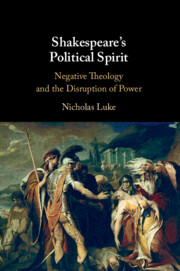Book contents
- Shakespeare’s Political Spirit
- Shakespeare’s Political Spirit
- Copyright page
- Contents
- Acknowledgements
- Introduction
- Chapter 1 Jack Cade in a Time of Protest
- Chapter 2 The Spirit of Caesar and the Second Circle
- Chapter 3 Coriolanus and the Work of Spirit
- Chapter 4 Not to Be – To Be
- Chapter 5 The Tempest and the Spirit of the Air
- Afterword
- Notes
- Works Cited
- Index
Afterword
Published online by Cambridge University Press: 12 December 2024
- Shakespeare’s Political Spirit
- Shakespeare’s Political Spirit
- Copyright page
- Contents
- Acknowledgements
- Introduction
- Chapter 1 Jack Cade in a Time of Protest
- Chapter 2 The Spirit of Caesar and the Second Circle
- Chapter 3 Coriolanus and the Work of Spirit
- Chapter 4 Not to Be – To Be
- Chapter 5 The Tempest and the Spirit of the Air
- Afterword
- Notes
- Works Cited
- Index
Summary
The Afterword turns to Adorno’s Negative Dialectics to reflect upon the broader significance of Shakespeare’s negativity in inspiring our literary and political imaginaries. To break from tragic law, to experience freedom, is to suffer the fear and trembling of becoming something other. It is to experience a transformative mode of thought that opens us imaginatively to what is not – but might be. The negative – this “not” – alienates the divinity of the moment, be it the divine right of kings or more contemporary mystifications of power, and offers a perspective that is in some sense from “beyond”. Negative theology, too, reaches for “something more” as the locus of value and meaning, as the judge of what is. That is why it has a radical political potential. What we usually take “being” to be does not exhaust Being. This is something that negative theology, philosophy, and poetry have always told us. The negative brings us beyond ourselves. Beyond, also, the confines of our own political worldviews, often dominated by modern versions of appropriation and calculation. There are more things in heaven and earth than are dreamt of in our political philosophies.
- Type
- Chapter
- Information
- Shakespeare's Political SpiritNegative Theology and the Disruption of Power, pp. 231 - 239Publisher: Cambridge University PressPrint publication year: 2024

